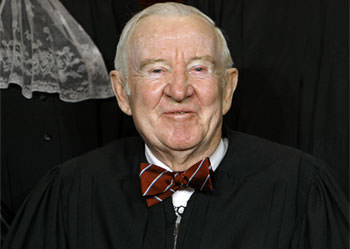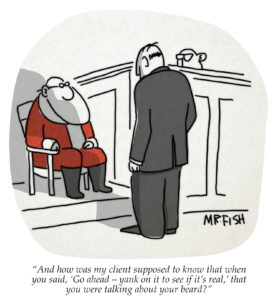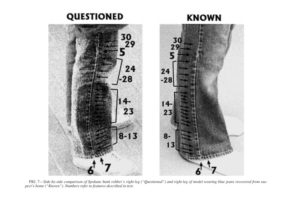Truthdigger of the Week: John Paul Stevens
Truthdig salutes the 86-year-old Supreme Court justice who wrote the majority opinion in Hamdan v. Rumsfeld, which struck down the military tribunals Bush set up to try Guantanamo detainees. But more important, this decision, in the words of a Yale law professor, "effectively undermines the Administration's strongest claims about Presidential power," and may constitute the legal framework necessary to halt the more egregious of Bush's civil liberties-infringing programs -- like warrantless wiretapping and holding terrorism suspects without trial.
Truthdig salutes the 86-year-old Supreme Court justice who wrote the majority opinion in Hamdan v. Rumsfeld, which struck down the military tribunals Bush set up to try Guantanamo detainees. But more important, this decision, in the words of a Yale law professor, “effectively undermines the Administration’s strongest claims about Presidential power,” and may constitute the legal framework necessary to halt the more egregious of Bush’s civil liberties-infringing programs — like warrantless wiretapping and holding terrorism suspects without trial.
While Stevens’ Hamdan opinion appears on its surface to be merely concerned with statutory interpretation, it effectively undermines the Administration’s strongest claims about Presidential power. Justice Kennedy’s concurrence makes the constitutional points more explicitly, and that is why, I predict, his concurrence will become as important as the majority opinion itself.
In particular, Hamdan undermines the Administration’s arguments for the NSA’s power to engage in domestic surveillance. As you may recall, the Administration offered two arguments for why it did not have to conform with the Foreign Intelligence Surveillance Act (FISA). The first is that the September 18th, 2001 Authorization of the Use of Military Force (AUMF) provided independent statutory authority to spy on citizens outside of the limits in FISA; the second was that FISA is unconstitutional to the extent that it limits the President’s Article II powers as Commander-in-Chief to engage in wartime surveillance. (Note that FISA already has built-in exceptions for wartime which the NSA program does not comply with.)
Hamdan undermines both of these arguments. The President could– and did– argue that the AUMF gave him authority to establish military commissions any way he liked. Second, the President could argue that he had inherent authority under Article II to establish military commissions under whatever rules he chose and that to the extent that Congress limited his discretion it acted unconstitutionally. Therefore courts should construe all Congressional statutes (and the Geneva Conventions) to avoid clashing with the President’s discretion.
Your support matters…Independent journalism is under threat and overshadowed by heavily funded mainstream media.
You can help level the playing field. Become a member.
Your tax-deductible contribution keeps us digging beneath the headlines to give you thought-provoking, investigative reporting and analysis that unearths what's really happening- without compromise.
Give today to support our courageous, independent journalists.






You need to be a supporter to comment.
There are currently no responses to this article.
Be the first to respond.